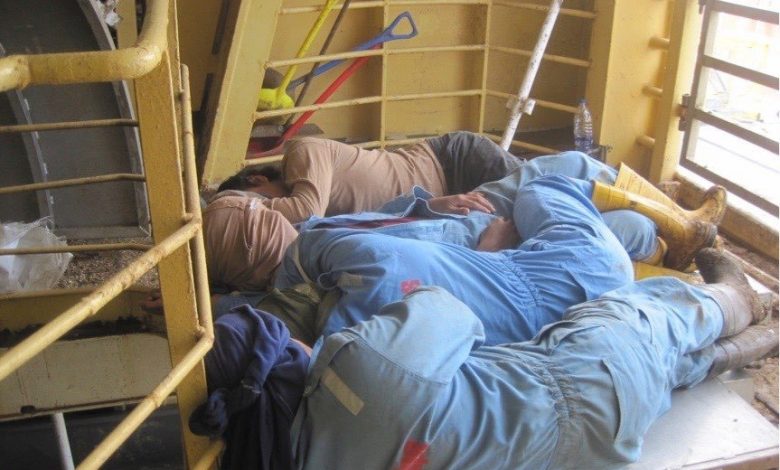Greater transparency needed to improve human rights in shipping

The opaque nature of shipping is leading to massive exploitation and human rights abuses with a real risk that many seafarers are now essentially enslaved. That’s the view of Ben Bailey, assistant director of advocacy at charity The Mission to Seafarers.
Bailey provided a report from a recent panel debate in Oslo attended by leaders in seafarer welfare in which the Maritime Labour Convention (MLC), among other things, came in for heavy criticism.
Introduced in 2006, the MLC has been guaranteeing seafarers the right to decent work conditions, accommodation, food, and medical care, amongst other standards. However, seafarers can be vulnerable to exploitation and abuse when working in isolated conditions, away from friends, family, and support networks, and while dependent on their employers to provide any means of communication with the outside world.
An expert panel, made up of representatives from the RAFTO Foundation, the Institute for Human Rights and Business, Norwegian OECD NCP, and Human Rights at Sea, came together earlier this month to discuss the challenges associated with tackling this issue, and strategies for its elimination from the shipping industry.
“The key agreement from the debate was that the shipping industry needs to increase levels of transparency when it comes to human rights,” said Bailey. “The term human rights is notably absent from instruments such as the Maritime Labour Convention, leaving space for exploitative practices to be carried out by less scrupulous members of our industry. Increased cross-industry collaboration and closer work with NGOs, would allow the shipping industry to create and enforce policies which reduce bonded labour, and ensure the industry is a safe and attractive career option for seafarers globally.”
Although the panel agreed that the MLC is a basic set of rights for crews, there were calls for national legislatures to do more to protect workers operating in their territorial waters and exclusive economic zones. There was a strong consensus that the shipping industry is behind the curve both in terms of action and discussion of human rights, and that among less conscientious shipowners and operators, there can be a tendency to see human rights as a “tick-box exercise” that must be gone through, as opposed to a necessary and beneficial opportunity to create a fair and productive working environment.
All panellists came together to urge investors and buyers to use their commercial power and ensure that their operations, and those of their suppliers or charterers, are open to scrutiny, and that human rights diligence is performed to the standards laid out by the International Labour Organisation.
“Exploitation within the shipping industry goes deeper than conditions on board vessels. When crews come to us, the problems they have often have roots within the shadier side of shipping, with harmful employment practices and bonded labour coming up on a regular basis. We believe that the debate was an important step forward in ensuring all people connected with our industry are treated with fairness and dignity.” Bailey concluded.

The last two paragraphs sum up the crux of the matter. The consciences ashore need to be stimulated. We want cheaper goods and cheap means of transportation and everything must be cheap because we are all in the business of saving money or making money. The bottomline is that the bottomline drives the exploitation of people, seafarers in this instance. The neo-liberals must be proud, this is what is called market forces at work…labour is a commodity, no matter the lofty pronouncements of the ILO. The matter of the MLC is for another time as I continue my studies.
Thank you to The Mission for hosting this event with the RAFTO Foundation at NOR Shipping. It was truly refreshing to be amongst Norwegian shippers who understand this issue and the need for business and human rights to be applied under the 2011 UN Guiding Principles on Business and Human Rights – a message that Human Rights at Sea has been actively promoting for four years to a brick wall and deafening silence from industry. In 2013 I was informed by a senior individual in a large shipping association that they would only act if their members wanted them to. Change, however, seems to be afoot from individual States, albeit slowly. Its time to be better engaged and informed about human rights provisions and protections in the maritime space and which is not just all about (essential) labor rights and collective bargaining.
David Hammond, CEO, Human Rights at Sea.
ITUC Global Rights Index indicates India, China, Philippines ( Grade 5) and Indonesia ( Grade 4) all towards the lower end of the index graded from 1 to 5*. These are the countries that supply the major porion of seafarers to the shipping industry. It is obvious then that these member states will only provide lip service to the issue of human rights for their seafarers. Even if they ever want to, the iron curtain of the Flags of Convenience provides sufficient shelter to shipowners to drag their feet. An abandoned crew could wait upto 10 years before being repatriated home (without a settlement of their wages).
The simplest way to achieve transparency is to give the crew access to the Internet…
Hmm…